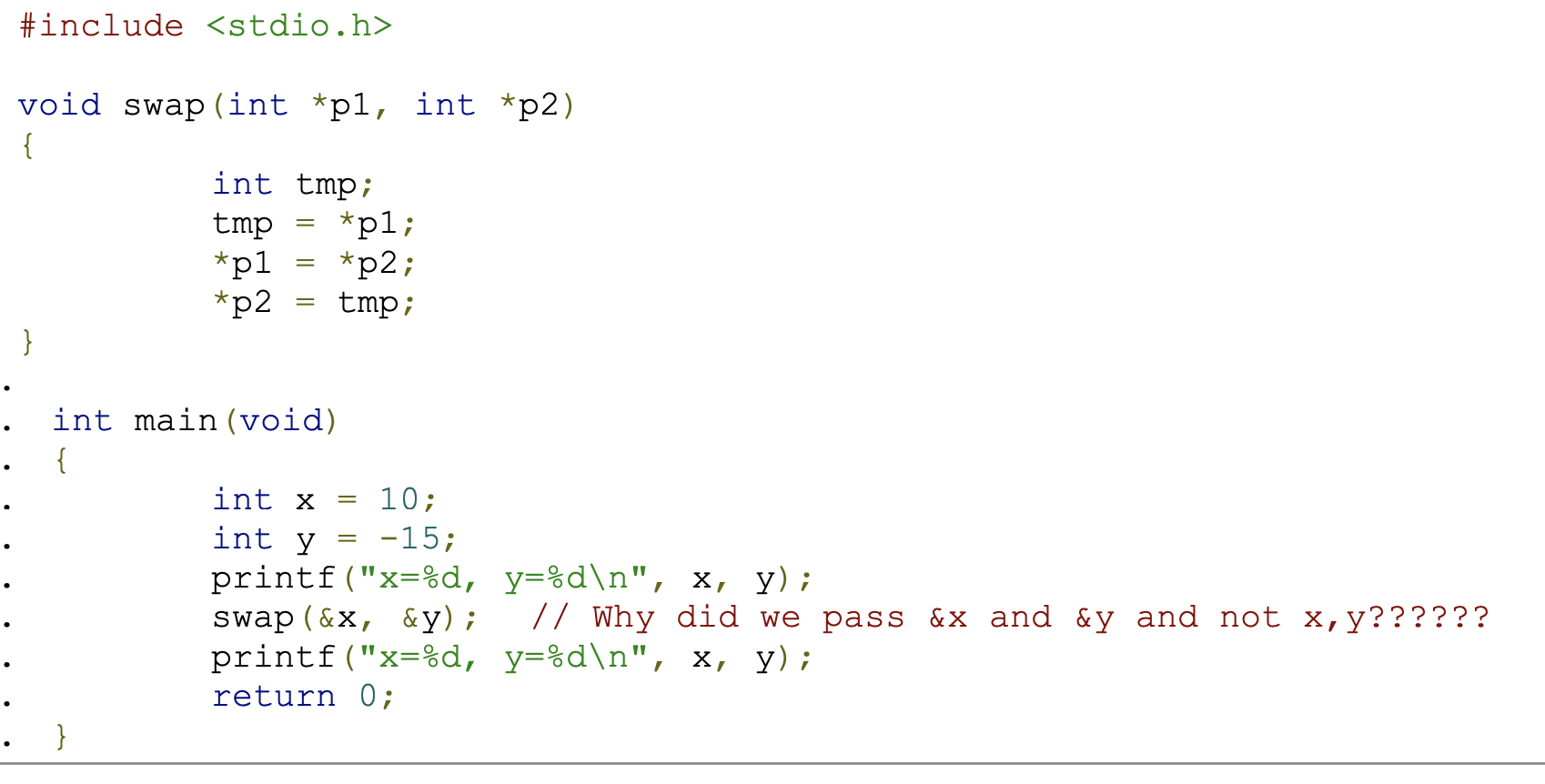Pointer
This is the most confusing topic ever. Check out the Wikipedia to fully understand https://en.wikipedia.org/wiki/Pointer_(computer_programming)
A pointer points to an address of another variable.
C++ Pointer Syntax
In CS137, the syntax we learned to declare a pointer is
int *a. However, in general, the preferred syntax in C++ isint* a. Do that at interviews and in practice.
string* mystring; // Preferred
string *mystring;
string * mystring;An Array name is just a pointer to the first element in the array, i.e. if a is an array,
printf("%p\n", a);
printf("%p\n", &a[0]);print the same thing (will print the address).
int i = 6;
int *p; //It's important to declare what type the pointer is point at
p = &i; //the & in front gives the memory address of i
*p = 10; //Putting the * will change the value. In this case, p is changed to 10, so i changes to 10 as well
printf("%d \n", i); //Will print 10
int *q = p;
*q = 17;
printf("%d \n", i); //Will print 17The asterisks can be confusing.
*for multiplication*to define pointer*as a dereferencing operator.
Pointers can be super helpful in certain scenarios. Consider the case where you want to create a function swap(x,y). If you don’t pass the address, it will use a copy of the value and not actually swap x,y. You need to pass the addresses of x,y, and in the implementation, use pointers as arguments of the function.

Note
Since C only supports Call by Value, what we are actually doing above is using a pointer to “cheat” and reference the variables when the function is called.
Pointer Arithmetic
We can actually add integers to pointers. It just moves the pointer to the next address.
int a[8] = { 2, 3, 4, 5, 6, 7, 8, 9 };
int *p, *q, i;
p = &(a[2]); // p points to a[2]
q = p + 3;// q points to a[5]
p += 4;// p points to a[6]
q = q - 2; // q points to a[3]
//This is also legal
i = p - q; // i = 3
i = q - p; // i = -3The * operator and ++ operator can be combined:
*p++is the same as*(p++)(Use*pfirst then increment pointer).(*p)++(Use*pfirst then increment*p, increment the content that p is pointing at).*++por*(++p)(Incrementpfirst then use*pafter increment).++*por++(*p)(Increment*pfirst then use*pafter increment).
Null Pointer
Since pointers are memory addresses, we need to be able to distinguish from a pointer to something and a pointer to nothing. The NULL pointer is how we do this. It can be called by
int *p = NULL;For C++, Use nullptr to say that a pointer is pointing to nothing.
int *p = nullptr;Note: From what I remember, there is some subtle difference in the way NULL and nullptr is used for C and C++.
WARNING BUG
I ran into this bug with multi-line pointer declaration.
int a, b, c; // This is fineHowever,
int* a, b, c; // INCORRECT
// Equivalent to
int *a;
int b;
int c;Pointer vs. Pointer Reference
Ran into this while working on my Biquadris project.
This blew my mind, but int*& x is allowed in C++. It declares a reference to a pointer to an integer. Essentially, it allows you to create an alias for a pointer variable.
void modifyPointer(int*& ptr) {
ptr = new int(10); // Modifies the original pointer
}
int main() {
int* myPointer = nullptr;
modifyPointer(myPointer); // myPointer now points to a new int with value 10
delete myPointer; // Clean up the allocated memory
return 0;
}Also see unique_ptr, where I try to understand the different between unique_ptr<Level> and unique_ptr<level>&.
Can you have a pointer to a Reference?
NO! Remember that a reference is just an alias. A pointer is a place in memory that has the address of something else, but a reference is NOT. StackOverflow